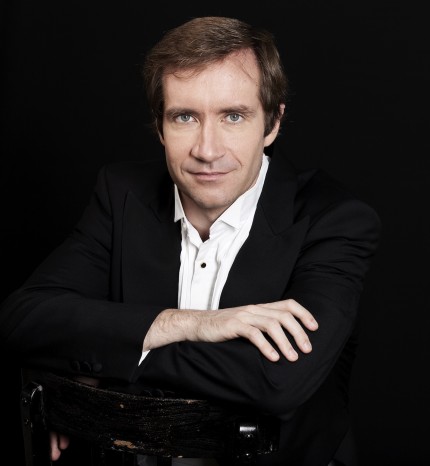Lugansky shows world-class artisty in Coral Gables recital

Nikolai Lugansky performed a piano recital Monday night for Friends of Chamber Music.
The last time Nikolai Lugansky played in Miami four years ago on a stormy, wind-tossed, night, the lights went out twice during the concert. Without missing a note or losing focus, the Russian pianist played on, scoring a personal triumph and kudos for poise under extreme performance conditions.
On Monday night Lugansky delivered a stunning recital for Friends of Chamber Music’s final event of the season. Playing an excellent Bösendorfer, Lugansky gave a demonstration of impeccable technique mixed with formidable musical intellect to a highly attentive audience at Coral Gables Congregational Church.
Opening with Harold Bauer’s transcription of Franck’s Prelude, Fugue and Variations, Lugansky took a spacious approach to the introductory measures. Stating the Bachian fugal theme in the right hand with the left adding counterpoint, Lugansky brought finely terraced dynamics to Bauer’s arrangement of this organ work. Although he had plenty of thunderous power in the big climactic moments, Lugansky’s shading of the soft sections was exquisite.
Schubert’s Impromptu No. 3 in B-flat Major was assayed with delicacy and charm. With judicious pedaling and fine coloring, Lugansky brought depth of expression to the minor key episode without sacrificing the music’s songful line.
Beethoven’s Sonata No. 30 in E Major, Op. 109 received a performance that captured the score’s grandeur and profundity. A heaven-storming first movement strongly demonstrated Lugansky’s accuracy, sensitivity and pristine musicianship. The Prestissimo was all fiery bravura yet every note was clearly placed. In the third movement Lugansky phrased the main subject with eloquence yet brought rigor as well as poetry to the succeeding variations. Lugansky’s performance wholly inhabited the world of late Beethoven—daringly original with great emotional power.
If the pianist’s towering Beethoven was the concert’s peak, the remainder of the program was anything but anticlimactic. The pianist immediately struck the right aura of Spanish color and austere simplicity in Albeniz’s Azulejos. His dynamic range was huge, almost orchestral at times with all the tricky hand crossings smoothly negotiated. There was also deft rhythmic acuity in “El Albaicin” from Iberia with Lugansky bringing special beauty to the bell-like quiet sections.
Rachmaninoff has been central to Lugansky’s career, and the Six Moments Musicaux, Op. 16, brought out both sides of his musical personality. There was old-school Russian virtuosity in the Allegretto and concluding Maestoso. Through supple tonal gradations, he also evoked the ruminative sadness of the Andantino and the melodic warmth of the Adagio sostenuto. The Presto brought playing of tremendous heft and flexibility, with the rumbling bass line always clearly audible.
Prolonged standing ovations brought two encores. Lugansky eschewed the conventional for works by less frequently played Russian composers. Nikolay Medtner’s Canzona Serenata offered a rhapsodic blend of Russian fireworks and poignant melody. In Nikolai Kapustin’s Etude, Lugansky attacked the jazzy rhythms at finger-busting speed, showing remarkable agility and sonority.
The 2016-2017 season of Friends of Chamber Music features pianists Stephen Hough, Denis Kozhukhin, Kirill Gerstein, Benjamin Grosvenor and Nikolai Lugansky, the Hugo Wolf Quartet with cellist William De Rosa, the Kalichstein Laredo Robinson Trio, the Borodin Quartet with pianist Joseph Kalichstein and the Ehnes Quartet with violist Roberto Diaz. miamichambermusic.org.
Posted in Performances
Leave a Comment
Tue Mar 22, 2016
at 2:27 pm
No Comments






